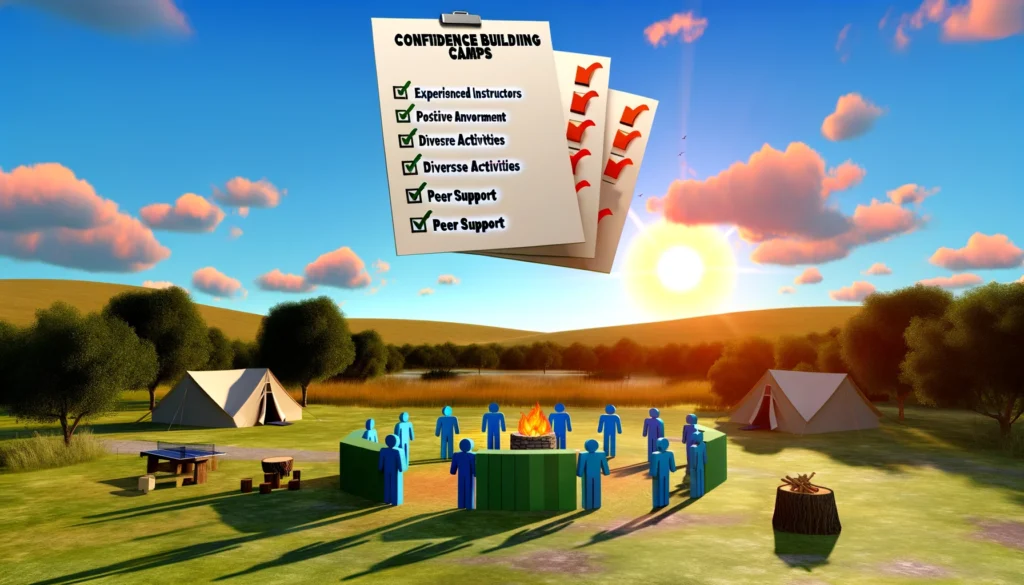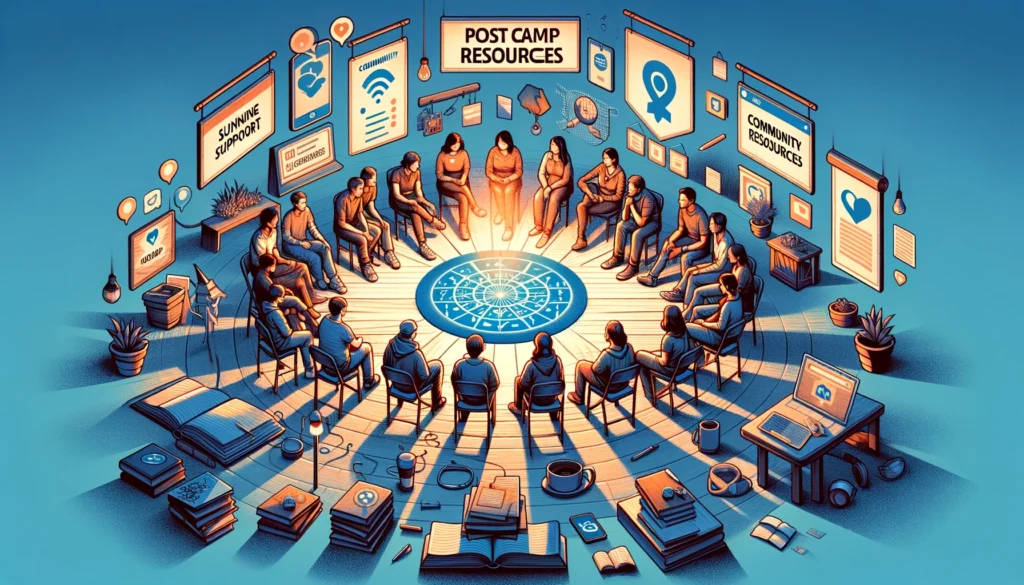Last updated on August 25th, 2025
Are you struggling with low self-esteem? Do you feel like you lack self-confidence in your personal and professional life?
If you’re struggling with low self-esteem, attending a self-esteem and confidence building camp can help you develop the skills and tools you need to feel more confident and self-assured.
These camps offer a supportive environment where you can learn from experienced coaches and counselors, connect with like-minded individuals, and engage in activities designed to help you build your self-esteem.
There are many different self-esteem and confidence building camps for adults to choose from, each with its own unique approach and focus.
Some camps focus on outdoor activities like hiking and rock climbing, while others offer workshops and classes on topics like mindfulness, communication, and personal growth.
No matter what your interests and goals are, there is likely a camp out there that can help you build your confidence and self-esteem.
In this article, we’ll explore 15 of the best self-esteem and confidence building camps for adults.
We’ll provide an overview of each camp’s approach, activities, and amenities to help you find the right fit for your needs and preferences.
Whether you’re looking to challenge yourself physically, explore new interests, or simply connect with others who share your struggles, these camps can help you build the confidence and self-esteem you need to thrive.
Why Self Esteem and Confidence is Important
Having a healthy level of self-esteem and confidence is important for leading a fulfilling life. It enables you to believe in yourself, take on new challenges, and achieve your goals.
Self-esteem is the foundation of mental health, and it affects every aspect of your life, including your relationships, work, and overall well-being.
When you have high self-esteem, you are more resilient to stress, less likely to develop anxiety or depression, and more likely to have positive relationships.
You are also more likely to take care of yourself, make healthy choices, and take risks that lead to personal growth.
On the other hand, low self-esteem can hold you back from reaching your full potential. It can lead to negative self-talk, self-doubt, and feelings of worthlessness.
It can also make you more vulnerable to stress, social anxiety, and depression.
Fortunately, self-esteem and confidence can be developed and strengthened through various activities and practices.
Attending self-esteem and confidence building camps for adults and young adults is one way to achieve this.
These camps provide a supportive environment where you can learn new life skills, connect with others, and gain a sense of accomplishment.
Criteria for Selecting Confidence Building Camps
When selecting a confidence building camp, it is important to consider several criteria to ensure that you get the most out of your experience. Here are some factors to keep in mind:
1. Camp Focus
First and foremost, you should consider the focus of the camp. Some camps may be geared towards specific activities such as wilderness survival, while others may offer a more holistic approach to building self-confidence and self-esteem. Determine what your goals are and choose a camp that aligns with those goals.
2. Expertise of Staff
The expertise of the staff is another crucial factor to consider. Look for camps that have experienced counselors and facilitators who are knowledgeable in the area of confidence building and have a track record of success.
3. Size of Camp
The size of the camp can also impact your experience. While larger camps may offer more activities and amenities, smaller camps may provide a more intimate and personalized experience.
4. Location
Consider the location of the camp and whether it is easily accessible to you. Some camps may be located in remote areas, which can add to the adventure but may also make it more difficult to get to.
5. Cost
Finally, you should also consider the cost of the camp. While some camps may be more expensive, they may offer more amenities and a higher level of expertise. Determine what your budget is and choose a camp that fits within that budget.
Types of Camp Activities and Workshops
While specific camps can vary widely in their focus, location, and methodology, Here are some of the most common types of activities and workshops you can expect to find at self-esteem and confidence building camps:
1. Outdoor Adventure Camps: These camps typically involve activities like rock climbing, wilderness survival, hiking, kayaking and team sports by pushing you out of your comfort zone and challenging you to overcome obstacles.
The goal is to push participants physically and mentally, promoting a sense of accomplishment and self-reliance.
These activities can also help you develop a deeper appreciation for nature and the environment. Example: Outward Bound offers courses that emphasize personal growth through adventure.
2. Leadership Retreats: Aimed at developing leadership skills, these retreats include workshops on public speaking, team management, and conflict resolution.
They are often held in serene settings to encourage reflection and personal development. Leadership training workshops can help you develop the skills you need to become a more confident and effective leader.
These workshops may cover topics such as goal setting, decision making, and time management. They may also include hands-on activities such as team building challenges and group projects.
3. Mindfulness and Meditation Retreats: These workshops can help you develop a more positive and confident mindset by teaching you how to focus your thoughts and emotions.
These programs focus on cultivating self-awareness and emotional resilience through practices like guided meditations, breathing exercises, yoga and mindfulness exercises.
They can also help you learn how to manage stress and anxiety more effectively. They aim to help individuals develop a peaceful mind, leading to greater self-confidence.
4. Fitness and Wellness Camps: Combining physical activity with nutrition and wellness education, these camps aim to improve participants’ health and self-image.
Activities might include boot camps, yoga, and nutrition workshops.
5. Artistic and Creative Workshops: Focusing on creative expression through art, writing, music, or drama, these workshops help individuals explore and express their inner selves, develop inner strength, inner beauty, inner peace and boosting confidence through creativity.
6. Public Speaking and Communication Workshops: Specifically designed to improve verbal communication skills. Effective communication is key to building self-esteem and confidence.
Communication skills workshops can help you learn how to express yourself more clearly and confidently.
These workshops may cover topics such as active listening, nonverbal communication, and conflict resolution.
7. Team Building Exercises: These are a great way to improve your self-esteem and confidence by working with others towards a common goal.
These exercises can range from simple icebreakers to more complex group challenges.
Some examples of team building exercises include trust falls, problem-solving challenges, and group games.
8. Professional Development Seminars: Aimed at enhancing career skills, these seminars cover topics like networking, resume building, and interview techniques.
They are designed to boost confidence in professional settings.
9. Personal Development Retreats: These retreats offer a combination of activities focused on self-discovery, goal setting, and overcoming personal barriers.
They often include one-on-one coaching sessions.
10. Adventure Therapy Programs: Integrating therapeutic sessions with adventure activities, these programs aim to address underlying confidence issues through experiential learning.
11. Cultural Immersion Programs: Traveling to and living in a new culture can significantly boost confidence. These programs often include language classes, cultural workshops, and community service.
12. Volunteer Abroad Programs: Working on community projects in foreign countries can enhance self-esteem and global awareness, as well as providing a sense of purpose.
13. Entrepreneurship Bootcamps: For those looking to start their own business, these bootcamps cover business fundamentals, pitching, and financial planning, fostering confidence in entrepreneurial abilities.
14. Digital Detox Retreats: By disconnecting from digital devices like cell phones and focusing on real-world interactions, participants can work on social skills and self-reflection, leading to improved self-confidence.
15. Self-Defense and Martial Arts Retreats: Learning self-defense techniques not only improves physical strength but also instills a sense of security and confidence.
16. Cooking and Culinary Retreats: These retreats focus on cooking skills, nutrition, and food as a form of self-care and expression, boosting confidence through mastery of a practical and enjoyable skill.
When choosing a confidence-building camp, consider what areas you wish to develop and select a program that aligns with your interests and goals.
Many of these programs are offered globally, so it’s possible to find one that fits your geographical preferences as well.
Benefits of Attending Confidence Camps
Attending a confidence camp can be a life-changing unique experience that can help you develop a positive self-image and boost your self-esteem. Here are some of the benefits of attending a confidence camp:
1. Personal Growth
Confidence camps provide a unique opportunity for personal growth. They help you learn new skills, develop new interests, and gain new perspectives. By stepping out of your comfort zone and trying new things, you can discover your strengths and weaknesses and learn how to overcome challenges.
2. Improved Communication Skills
Good communication skills and social skills are essential for building healthy relationships and achieving success in life. Confidence camps provide a supportive environment where you can practice your communication skills and learn how to express yourself effectively.
3. Enhanced Self-Awareness
Attending a confidence camp can help you become more self-aware. By reflecting on your thoughts, feelings, and behaviors, you can identify areas where you need to improve and develop a better understanding of yourself.
4. Increased Self-Esteem
Confidence camps can help you build self-esteem by providing opportunities to achieve success and recognition. By setting and achieving goals, you can develop a sense of accomplishment and pride in your abilities.
5. New Connections
Confidence camps provide an opportunity to meet new people and make new connections. By interacting with others who share your interests and goals, you can develop new friendships and supportive relationships networks that can last a lifetime.
6. Fun and Relaxation
Finally, attending a confidence camp can be a fun and relaxing experience. It provides an opportunity to take a break from the stresses of daily life and enjoy new activities and experiences in a supportive and encouraging environment.
Top 15 Confidence Building Camps
Here are 15 of the best confidence building camps for adults to consider:
1. Outward Bound – Various locations globally, including the USA, UK, and Canada. Outward Bound offers outdoor education programs that focus on personal growth, leadership skills, and team-building through wilderness adventures.
2. The Hoffman Process – Locations include the USA (California), UK, and other parts of Europe. The Hoffman Process is a week-long retreat focused on emotional healing and personal development.
3. Toastmasters International – Worldwide locations. Toastmasters clubs focus on public speaking and leadership skills, helping members build confidence in communication.
4. Landmark Worldwide – Various global locations. Landmark offers programs in personal development, focusing on improving self-confidence through breakthrough insights and real-life applications.
5. Tony Robbins Events – Various international locations. Tony Robbins’ seminars and workshops, like “Unleash the Power Within,” are designed to empower individuals in achieving personal and professional goals.
6. Mindvalley Quests – Primarily online with occasional live events worldwide. Mindvalley focuses on personal growth through digital courses covering topics like mindfulness, leadership, and productivity.
7. Omega Institute – Rhinebeck, New York, USA. Omega offers workshops and retreats on wellness, mindfulness, creativity, and leadership.
8. Esalen Institute – Big Sur, California, USA. Esalen is known for its workshops on personal growth, meditation, massage, ecology, and spirituality.
9. National Outdoor Leadership School (NOLS) – Various locations, including the USA, Patagonia, and the Himalayas. NOLS offers wilderness and outdoor education and leadership programs.
10. Adventure Women – Various global destinations. Specializing in adventure travel for women, these trips aim to build confidence through physical activity and cultural immersion.
11. Miraval Resorts – Locations in Arizona, Texas, and Massachusetts, USA. Miraval offers wellness retreats focusing on mindfulness, stress management, and self-care.
12. The Art of Living Retreat Center – Boone, North Carolina, USA. This center offers workshops and retreats on meditation, yoga, and personal development.
13. Wilderness Adventure at Eagle Landing – New Castle, Virginia, USA. This camp offers outdoor adventure programs designed to build leadership and teamwork skills.
14. Mountain Trek Fitness Retreat & Health Spa – Ainsworth Hot Springs, British Columbia, Canada. Mountain Trek offers fitness and weight loss retreats focused on holistic health and stress reduction.
15. Global Leadership Adventures – Various global locations. Though primarily for young people in their teen years, they offer adult programs focusing on leadership, service, and cultural immersion.
These programs and locations offer a starting point for finding confidence-building opportunities.
These 15 confidence building camps are just a few of the many options available for adults looking to boost their self-esteem and confidence.
Whether you’re looking for a variety of outdoor experiences or personal growth workshops, there’s a camp out there that can help you achieve your goals.
Choosing the Right Camp for You
When it comes to choosing the right self-esteem and confidence building camp for adults, there are a number of factors to consider.
Below are some important considerations that can help you choose the right camp for your needs.
Location Considerations
One of the first things to consider is the location of the camp. Do you want to attend a camp that is close to home or are you willing to travel to a different state or even country?
Consider the type of environment you want to be in as well. Do you prefer a rural or urban setting? Do you want to be near the beach or in the mountains?
Duration and Scheduling
Another important consideration is the duration of the camp and how it fits into your schedule. Some camps are just a few days long, while others can last several weeks.
Consider how much time you can commit to attending a camp and whether it fits with your work or other commitments.
Camp Philosophy and Approach
It’s important to choose a camp that aligns with your personal philosophy and approach to self-esteem and confidence building.
Some camps may focus on traditional therapy approaches, while others may use more experiential or holistic methods. Research the camp’s philosophy and approach to determine if it’s a good fit for you.
Cost and Budgeting
Finally, cost is an important consideration when choosing a self-esteem and confidence building camp.
Some camps may be more expensive than others, so it’s important to determine your budget and research the costs of different camps.
Keep in mind that some camps may offer scholarships or financial assistance, so be sure to inquire about these options if cost is a concern.
Preparing for a Confidence Building Camp
Going to a confidence building camp can be a transformative experience that helps you develop a positive self-image and a can-do attitude.
To make the most of your time at camp, you should prepare yourself mentally and physically. Here are some tips to help you get ready for your confidence building camp:
Mental Preparation
- Set Goals: Before you go to camp, think about what you want to achieve. Setting goals will help you focus your efforts and measure your progress. Write down your goals and keep them in a place where you can see them every day.
- Visualize Success: Imagine yourself succeeding in your goals. Visualizing success can help you build confidence and reduce anxiety.
- Be Open-Minded: Be open to new camp experiences and ideas. You may be asked to participate in activities that are outside your comfort zone, but that is where growth happens.
- Stay Positive: Focus on the positive aspects of yourself and your life. Avoid negative self-talk, engage in positive self-talk and surround yourself with positive people who support your growth.
Physical Preparation
- Get in Shape: Participating in confidence building activities can be physically demanding. Start exercising regularly before you go to camp to build strength and endurance.
- Pack Appropriately: Check the weather forecast and pack clothing that is appropriate for the conditions. Bring essentials such as comfortable clothes, toiletries, and any necessary medication. Consider bringing a journal to document your experience and reflect on your personal growth. Other ideas include bringing a book, a yoga mat, or a musical instrument. Be sure to check with the camp beforehand to see what items are allowed.
- Stay Hydrated: Drinking plenty of water will help you stay alert and energized. Bring a water bottle with you and refill it often.
- Get Enough Sleep: A good night’s sleep will help you stay focused and energized during the day. Try to get at least 7-8 hours of sleep each night.
By following these tips, you can prepare yourself mentally and physically for your confidence building camp. Remember to stay positive, be open-minded, and have fun!
Measuring Your Progress
Building self-esteem and confidence is a process that takes time and effort. It’s important to track your progress to see how far you’ve come and to stay motivated. Here are a few ways to measure your progress:
Self-Reflection
Take some time to reflect on your journey and how you’ve grown. Ask yourself questions such as:
- What challenges have I overcome?
- What new skills have I learned?
- How have my thoughts and behaviors changed?
- What positive feedback have I received from others?
Write down your answers in a journal or notebook. This will help you see the progress you’ve made and remind you of your accomplishments.
Goal Setting
Setting goals is a great way to measure your progress. Start by setting small, achievable goals that align with your values and interests.
As you achieve these goals, set new ones that are slightly more challenging. This will help you build momentum and confidence.
Self-Esteem Assessments
There are various self-esteem assessments available that can help you measure your progress. The Rosenberg Self-Esteem Scale is a widely used assessment tool that measures self-esteem levels.
You can also try other assessments such as the Self-Esteem Survey, which is designed to help clinicians assess their client’s strengths and needs in terms of self-esteem.
Remember, building self-esteem and confidence is a journey, not a destination. Celebrate your progress, no matter how small, and keep moving forward.
Post-Camp Support and Resources
Attending a self-esteem and confidence building camp can be a life-changing experience, but it’s important to remember that the journey towards self-improvement doesn’t end when the camp is over.
Many camps offer post-camp support and resources to help you continue your personal development.
One common form of post-camp support is online resources. Some camps provide access to online forums or chat rooms where you can connect with other campers and continue to receive support and encouragement.
You may also be able to access online courses or webinars to continue learning and developing new skills.
Another form of post-camp support is ongoing coaching or counseling. Some camps offer follow-up coaching sessions with the camp’s staff members or outside professionals to help you stay on track with your personal goals.
This can be particularly helpful if you struggle with maintaining motivation or accountability on your own.
Finally, many camps provide recommendations for additional resources, such as books, podcasts, or support groups, that can help you continue your personal growth journey.
These resources can be a great way to stay inspired and motivated, and to continue learning and growing even after the camp is over.
Remember, the journey towards improved self-esteem and confidence is a lifelong process, and attending a camp is just one step along the way.
By taking advantage of post-camp support and resources, you can continue to build on the progress you made at camp and continue to grow and develop as a person.
Frequently Asked Questions – Confidence Building Camps for Adults
What activities can adults engage in at confidence building camps?
Confidence-building camps for adults offer a variety of activities to boost self-esteem and improve confidence levels. These activities may include group discussions, mindfulness exercises, role-playing, and team-building games. Some camps may also offer outdoor activities such as hiking, rock climbing, and other adventure sports.
Which group exercises at camps are effective for enhancing self-esteem in adults?
Group exercises that focus on building trust, communication, and problem-solving skills are effective for enhancing self-esteem in adults. Activities such as trust falls, group problem-solving games, and team-building challenges can help individuals develop a sense of accomplishment and confidence.
How do confidence-building programs for adults typically structure their curriculum?
Confidence-building programs for adults typically structure their curriculum around a combination of group therapy sessions, experiential learning activities, and individual counseling. These programs may also incorporate mindfulness practices, cognitive-behavioral therapy (CBT), and other evidence-based therapeutic approaches.
What therapeutic approaches are used in camps to address adult self-esteem issues?
Confidence-building camps for adults may use a variety of therapeutic approaches to address self-esteem issues, including CBT, dialectical behavior therapy (DBT), and acceptance and commitment therapy (ACT).
These approaches may help individuals identify negative thought patterns, develop coping strategies, and improve self-awareness.
Can adults with mental health challenges benefit from self-esteem camps, and how?
Yes, adults with mental health challenges can benefit from self-esteem camps. These camps offer a supportive environment where individuals can work on building self-esteem and developing coping strategies for managing mental health issues.
The structured curriculum and therapeutic approaches used in these camps can help individuals develop a sense of control and confidence in their ability to manage their mental health.
What are the core components of a successful adult self-esteem and confidence building camp?
The core components of a successful adult self-esteem and confidence building camp include a supportive and non-judgmental environment. A structured curriculum that integrates evidence-based therapeutic approaches, experienced and qualified staff, a variety of activities that cater to different learning styles, and a focus on building self-awareness and self-compassion.
For more amazing tips, subscribe at pheelpretty.com.
Love what you see? Share the love with friends and pin it to your Pinterest. Every share and pin means the world to us, helping us inspire more people. Subscribe and share now—let’s make positive changes together.







